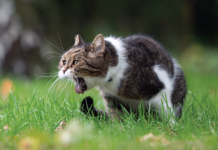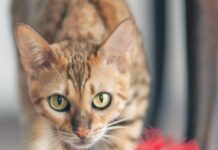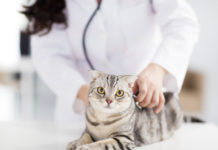Question: I was wondering why each time that I pet, stroke or otherwise show affection to my cats, they salivate continuously – so much so that it drips from their mouths. Is this something that I need to be concerned about?
Answer: Absolutely not. Now, if youd said something like, my cat has lost his appetite and he just sits like a sphinx and drools all the time, or he slobbers constantly and has really bad breath, or my cat cant hold anything down and his mouth is wet with saliva, then Id be much more concerned. Hypersalivation (the medical term is ptyalism) caused by a disease has many different causes ranging from mild and easy to cure, to serious or even fatal. One must consider oral cavity disease, salivary gland disease, esophageal disease or obstruction, poisoning, nausea from a host of causes, liver disease, neurological disease, cancer, infection … you get the drift. In such cases, finding the cause can present a formidable diagnostic challenge.
The Context Tells the Tale
The situation during which your cats hypersalivate lets me know you have a happy problem: You live with droolers. When I was a farm lad in Ohio, some of my first cat friends were droolers, and my folks could always tell which Id been snuggling with by how cat-slobber-soaked my T-shirt was. Droolers really enjoy affection, and they throw themselves with reckless abandon into the whole experience. Though not all droolers do this, I would venture a guess that your cats also close their eyes, purr and knead with their front paws while theyre slobbering.
Surprisingly, very little has been written on this charming (or not so charming, depending on the value of your slobbered-on clothing) feline behavior, so Ill have to make an educated guess as to why some cats do this. What are kittens earliest pleasurable experiences? Nursing on their mother. And what do kittens do when they nurse? Usually they purr, knead their front paws against their mothers abdomen to encourage milk release from the mammary glands and close their eyes (theres not a whole lot to look at in that position). Recall that salivation is another normal and necessary component during food ingestion (remember Pavlovs dog?). I personally believe that your cats behavior is linked to those earliest pleasurable experiences, so a similarly intense physical pleasure triggers the same physiologic response. Sounds plausible to me, but if my theory is correct, why dont all cats do this? Dont ask me, because I havent a clue! (Many feline mysteries remain…)
———-
Question: My cat doesnt meow or purr. Is there a reason for this? Should we be concerned? The cat is happy and healthy otherwise, and he gives other signals to tell us his needs.
Answer: If your cat has been a quiet fellow from the outset, then I dont believe you have anything to worry about, especially since he seems to be just fine otherwise. If his silence was something new, especially if it was accompanied by a problem – like a loss of appetite and weight, difficulty swallowing, or choking or coughing – then a phone call to your veterinarian should be the next item on your to-do list.
If You Have Nothing To Say, Say Nothing At All
Cats have a complex system of communication comprising three components: vocal, body language and visual/scent marking. Some cats are simply less vocal than others. Doubtless your cat has the physiologic ability to create the sixteen or so different cat sounds that have been identified; he just chooses to remain silent. (Even the quiet types will hiss, growl or wail when they perceive the need.)
Your statement, he gives other signals to tell us his needs, implies that youve become skilled at reading his silent body language, and Im sure hes a wonderful companion. Many of us who live with cats that vociferously demand to be fed at three oclock in the morning might be willing to swap roommates with you!



